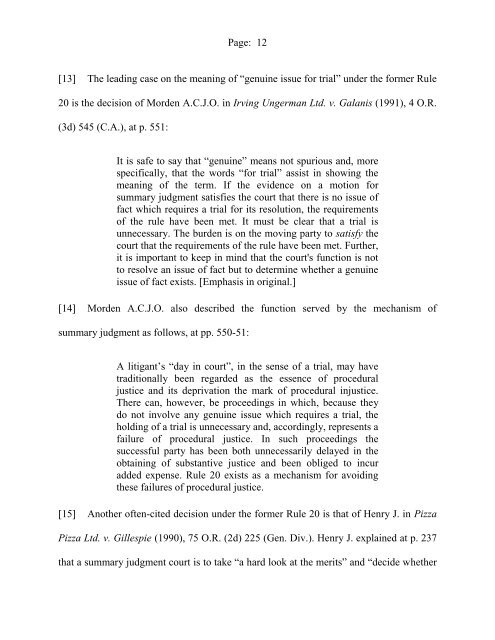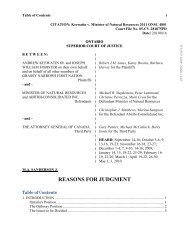COURT OF APPEAL FOR ONTARIO
COURT OF APPEAL FOR ONTARIO
COURT OF APPEAL FOR ONTARIO
Create successful ePaper yourself
Turn your PDF publications into a flip-book with our unique Google optimized e-Paper software.
Page: 12<br />
[13] The leading case on the meaning of “genuine issue for trial” under the former Rule<br />
20 is the decision of Morden A.C.J.O. in Irving Ungerman Ltd. v. Galanis (1991), 4 O.R.<br />
(3d) 545 (C.A.), at p. 551:<br />
It is safe to say that “genuine” means not spurious and, more<br />
specifically, that the words “for trial” assist in showing the<br />
meaning of the term. If the evidence on a motion for<br />
summary judgment satisfies the court that there is no issue of<br />
fact which requires a trial for its resolution, the requirements<br />
of the rule have been met. It must be clear that a trial is<br />
unnecessary. The burden is on the moving party to satisfy the<br />
court that the requirements of the rule have been met. Further,<br />
it is important to keep in mind that the court's function is not<br />
to resolve an issue of fact but to determine whether a genuine<br />
issue of fact exists. [Emphasis in original.]<br />
[14] Morden A.C.J.O. also described the function served by the mechanism of<br />
summary judgment as follows, at pp. 550-51:<br />
A litigant‟s “day in court”, in the sense of a trial, may have<br />
traditionally been regarded as the essence of procedural<br />
justice and its deprivation the mark of procedural injustice.<br />
There can, however, be proceedings in which, because they<br />
do not involve any genuine issue which requires a trial, the<br />
holding of a trial is unnecessary and, accordingly, represents a<br />
failure of procedural justice. In such proceedings the<br />
successful party has been both unnecessarily delayed in the<br />
obtaining of substantive justice and been obliged to incur<br />
added expense. Rule 20 exists as a mechanism for avoiding<br />
these failures of procedural justice.<br />
[15] Another often-cited decision under the former Rule 20 is that of Henry J. in Pizza<br />
Pizza Ltd. v. Gillespie (1990), 75 O.R. (2d) 225 (Gen. Div.). Henry J. explained at p. 237<br />
that a summary judgment court is to take “a hard look at the merits” and “decide whether
















